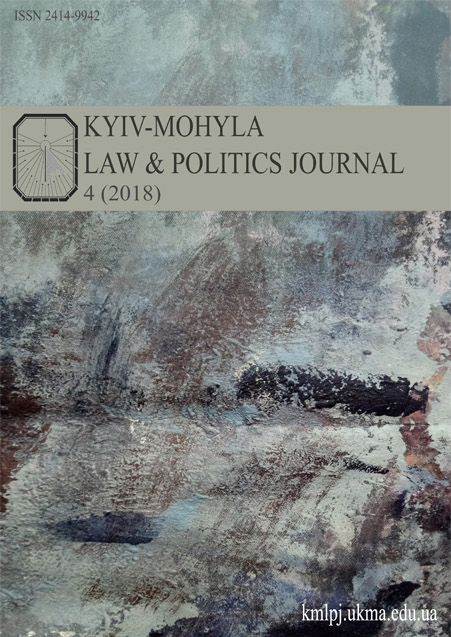Franck’s Right to Democratic Governance and the Role of Democratic Sanctions
DOI:
https://doi.org/10.18523/kmlpj153257.2018-4.137-157Keywords:
democratic sanctions, democracy, the democracy norm, democratic legitimacy, government’s legitimacyAbstract
In 1992, Tomas Franck conceptualized the democratic entitlement theory — a new approach regarding the international validation of governance, which was previously based solely on the “doctrine of effective control.” This led to the emergence of a new international norm under which only democracy can validate a government’s legitimacy. Twenty years later, the theory proposed by Franck has gained more currency. International organizations and states began and continue to address the legitimacy of a government by imposing democratic sanctions. This article proposes to corroborate the Franck democratic entitlement theory by incorporating democratic sanctions, while also consolidating cases where sanctions were applied, inter alia, construing legal status of such measures.References
- Buromenskyi, Mykhailo. “International Legal Standards of Internal Democracy.” Herald of the National Academy of Legal Sciences of Ukraine 2 (1997): 12–21.
- Case Concerning Military and Paramilitary Activities in and Against Nicaragua (Nicaragua v. United States of America); Merits, International Court of Justice (1986). Accessed December 4, 2018. http://www.refworld.org/cases,ICJ,4023a44d2.html. https://doi.org/10.1093/law/9780198743620.003.0021
- d’Aspremont, Jean. “Responsibility for Coups d’État in International Law.” Tulane Journal of International & Comparative Law 18.2 (2010): 451–475.
- d’Aspremont, Jean. “The Rise and Fall of Democracy Governance in International Law: A Reply to Susan Marks.” European Journal of International Law 22.2 (2011): 549–570. https://doi.org/10.1093/ejil/chr024
- Dawidowicz, Martin. Third-Party Countermeasures in International Law. Cambridge: Cambridge University Press, 2017. https://doi.org/10.1017/ajil.2018.101
- Dissenting opinion of Judge Schwebel in the Case Concerning Military and Paramilitary Activities in and Against Nicaragua (Nicaragua v. United States of America); Merits, International Court of Justice (1986). Accessed December 4, 2018. http://www.refworld.org/cases,ICJ,4023a44d2.html. https://doi.org/10.1093/law/9780198743620.003.0021
- Domber, Gregory F. Empowering Revolution: America, Poland, and the End of the Cold War. Chapel Hill: University of North Carolina Press, 2014. https://doi.org/10.5612/slavicreview.75.1.178
- European External Action Service, Compendium of International Standards for Elections, 4th ed. Luxembourg: Publication Office of the European Union, 2016.
- Farrall, Jeremy Matam. United Nations Sanctions and the Rule of Law. Cambridge: Cambridge University Press, 2007. https://doi.org/10.3366/e1364980909000845
- Franck, Thomas M. “Legitimacy and the Democratic Entitlement.” In Democratic Governance and International Law, edited by Gregory H. Fox and Brad R. Roth, 25–47. Cambridge: Cambridge University Press, 2000. https://doi.org/10.1017/cbo9780511522307.002
- Franck, Thomas M. “The Emerging Right to Democratic Governance.” American Journal of International Law 86.1 (1992): 46–91.
- Fox, Gregory H. “Democracy, Right to, International Protection.” Wayne State University Law School Research Paper (2007).
- Fox, Gregory H., and Roth R. Brad. “Introduction: The Spread of Liberal Democracy and Its Implications for International Law.” In Democratic Governance and International Law, edited by Gregory H. Fox and Brad R. Roth, 1–22. Cambridge: Cambridge University Press, 2000. https://doi.org/10.7202/704260ar
- Giumelli, Francesco. How EU Sanctions Work: A New Narrative. Paris: European Union Institute for Security Studies, 2013.
- Hufbauer, Gary Clyde, Jeffrey J. Schott, Kimberly Ann Elliott, Barbara Oegg. Economic Sanctions Reconsidered, 3rd ed. Washington: Peter G. Peterson Institute for International Economics, 2007. https://doi.org/10.2307/1960841
- Huntington, Samuel P. “The Third Wave: Democratization in the Late 20th Century.” Journal of Democracy 2.2 (1991): 12–34.
- Marinov, Nikolay and Shmuel Nili. “Sanctions and Democracy.” International Interactions 41.4 (2015): 765–778.
- Marks, Susan. “What has Become of the Emerging Right to Democratic Governance?” European Journal of International Law 22.2 (2011): 507–524. https://doi.org/10.1093/ejil/chr023
- Müftüler-Bac, Meltem. Turkey’s Relations with a Changing Europe. Manchester University Press, 1997.
- Murphy, Sean D. “Democratic Legitimacy and the Recognition of States and Governments.” In Democratic Governance and International Law, edited by Gregory H. Fox and Brad R. Roth, 123–154. Cambridge: Cambridge University Press, 2000. https://doi.org/10.1017/cbo9780511522307.005
- Orakhelashvili, Alexander. “The Impact of Unilateral EU Economic Sanctions on the UN Collective Security Framework: The Cases of Iran and Syria.” In Economic Sanctions under International Law, edited by Marossi A., Bassett M., 4–21. Hague: T. M. C. Asser Press, 2015. https://doi.org/10.1007/978-94-6265-051-0_1
- Pellet, Alain and Alina Miron. “Sanctions.” In Max Planck Encyclopedia of Public International Law, 1–15. Oxford: Oxford University Press, 2011. https://doi.org/10.1093/law:epil/9780199231690/e984
- Popper, Karl. The Open Society and Its Enemies: The High Tide of Prophecy: Hegel, Marx, and the Aftermath. London: George RoutLedge&Sons, Ltd., 1966. https://doi.org/10.1017/s0031819100005581
- United Communist Party of Turkey and Others v. Turkey (1998), the ECHR Judgment. Accessed December 4, 2018. https://www.refworld.org/cases, ECHR,4721cf132.html.
- Von Soest, Christian and Michael Wahman. “Are Democratic Sanctions Really Counterproductive?” Democratization 22.6 (2015): 957–980. https://doi.org/10.1080/13510347.2014.888418
- Vidmar, Jure. “Multiparty Democracy: International and European Human Rights Law Perspectives.” Leiden Journal of International Law 23.1 (2010): 209–240. https://doi.org/10.1017/s0922156509990392
- Wippman, David. “Pro-Democratic Intervention by Invitation.” In Democratic Governance and International Law, edited by Gregory H. Fox and Brad R. Roth, 293–327. Cambridge: Cambridge University Press, 2000. https://doi.org/10.1017/cbo9780511522307.010
Downloads
Published
How to Cite
Issue
Section
License
Copyright (c) 2018 Bohdan Bernatskyi

This work is licensed under a Creative Commons Attribution 4.0 International License.
Kyiv-Mohyla Law and Politics Journal provides free access to original research without restriction barriers (i.e. subscription fees, licensing fees etc.).
Unless otherwise indicated, content is licensed under the Creative Commons Attribution 4.0 International (CC BY 4.0) license, which means you are free to:
distribute, remix, tweak, and build upon your work, even commercially
...provided that any use is made with attribution to author(s) and Kyiv-Mohyla Law and Politics Journal.
The copyright in the article or any other submission to Kyiv-Mohyla Law and Politics Journal shall remain with the author(s).
The journal allows the author(s) to hold the copyright without restrictions and will retain publishing rights without restrictions.




